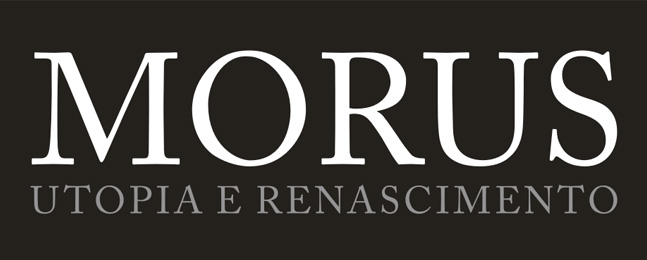 PROGRAM OF THE
PROGRAM OF THE2nd International Congress of Utopian Studies:
What is Utopia? Genre and Modes of Representation
Revista Morus – Utopia e Renascimento
On the occasion of the “Convegno Internazionale Scienza e Tecnica nell’utopia e nella distopia”, in May 2007, a congress jointly sponsored by Revista MORUS – Utopia e Renascimento and the Dipartimento di Studi Sullo Stato dell’Università degli Studi di Firenze, it was decided, by deliberation of its participants, to organize a second meeting in Brazil, the II International Congress of Utopian Studies: What is Utopia? Genre and Modes of Representation. It will take place at Unicamp (Universidade Estadual de Campinas/SP/Brazil), from June 7-10, 2009.
The aim of the II International Congress of Utopian Studies is to determine the literary nature of Utopia and define the modalities of its definition as a genre, as well as to examine the feasibility of such a project. This question leads to the appreciation of its historicity, its relation to the experience of traveling, its relation to social criticism, i.e., to politics: utopia mobilizes philosophical, linguistic, anthropological, religious, economic, and ethical reasoning, as well as all the fields of art: the fundamental aim is to convert it from a concept into an object. It’s a question of defining the genre as the starting point and the final goal of thought, observing it in concrete History, synthetically deducing the genre and eliminating the proceedings (which are rather dissolvent than enlightening), to define any imaginary social representation as utopia. This is the purpose of the II Congress.
Throughout the five centuries of their history, utopian writings have been constant interlocutors of different societies (and corresponding political theories), utopia itself being, sometimes, a political theory and a project of a society. Punctual definitions, although useful and true, do not solve the problem as a whole. Genre, an offspring of History, is the point. The solution could be putting the problem in a historical perspective: since Thomas Morus, who coined the word "Utopia", every description of any society which is supposedly perfect in every sense is called Utopia. The word literally means “that which is nowhere”. Any ideal of a human society which is supposed to be extremely desirable, but generally considered impracticable, is called “utopian”. The most general explanation of the origins of this literary genre basically follows the idea that Utopia was generated by the bourgeois process of rationalization of life, proper to the Renaissance. Probably none of the main authors of Renaissance utopias believed that the society which they depicted could be established, but, instead, they were moved by the desire to criticize the society of their times and to propose reforms, which were accomplished in the utopian society. Utopia was born under a favorable star: it represents, like The Prince and The Courtesan, a highlight of the Quattrocento Humanism, and maybe its limit, as well: the concept, built by the social praxis, that man can steer the course of his own destiny. Individual existence and associate living are seen as human and historical by Humanism and, thus, “moldable” by a teleology that, although it had always existed, reached an ephemeral emancipation. The belief in social perfectibility underlay the genesis of utopia, once human perfectibility was already intrinsic to the Christian concept. Utopia showed that society was incomplete and provided a solution to that problem. The literary formalization of the complete remission of social ills is, in itself, utopia. The text that builds a perfect polis with words imagines that social completeness is possible if Reason’s dictates are applied. As an allegory, utopia formalizes the contradictions of the moment of its composition and projects the notion of “eternal”, which is the product of that condition. The platonic ferment is evident in itself. Therefore, utopia is the image of social perfection, immanent to a concrete historical moment. Utopia is also the junction of the ethical perspective and the economy, which gives it a congenitally anti-capitalistic and revolutionary meaning.
Utopias have been an object of criticism for a long time, which means that they were, in this process, an object of evaluation and judgment: the history of evaluative and/or semantical variations of utopia was minutely studied by H. G. Funke[1]. As a result of these analyses, utopias were often accused of promoting a dilettante attitude towards the project of a new society, since they did not take into account “human realities”, such as ambitions, lust for power, etc., and for lagging behind scientific achievements of social engineering. It has also been stated that the revolutionary utopian spirit is the cause of its own dissolution, since revolutions, and thus changes and progress, cannot take place in a perfect society[2].
As a form of representation, the nature of utopia has raised an extraordinary number of issues, which attests its richness as a privileged subject of study. This meeting, thus, aims at looking for a definition of utopia as a genre and to investigate the feasibility of such a definition. The following fields of research are included: History, Philosophy, Literature, Anthropology, History of Art, Linguistics, Psychology, Politics, Sociology, Architecture, Urbanism, and Rhetoric.
Carlos E. O. Berriel
Editor of MORUS – Utopia e Renascimento
Professor of the Departamento de Teoria Literária/IEL/UNICAMP
[1] FUNKE, Hans Gunter. “L'évolution sémantique de la notion d’Utopie en français”. In: De l’utopie à l’uchronie. Ed. by Henrich HUDDE and Peter KUON, Tübingen, 1988, pp. 19-37.
[2] TROUSSON, Raymond. Viaggi in nessun luogo – Storia letteraria del pensiero utopico. Longo Editore, Ravenna, 1992.

Nenhum comentário:
Postar um comentário